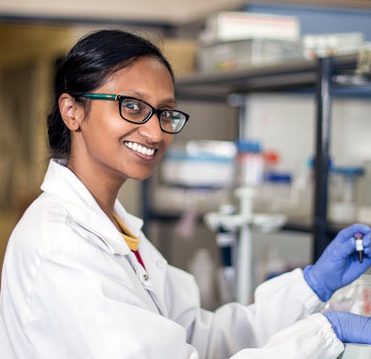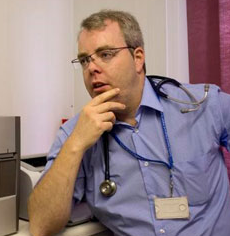S1E62: South Africa’s B.1.351 Variant — Immunity-Evading / Salim Abdool Karim, Richard Lessells, Jinal Bhiman, Allison Greaney
This is the second in our series on variants of concern. Our previous episode looked at the UK variant, and today we’re looking at the variant that emerged in South Africa: 501Y.V2. This variant is not only more transmissible, but has demonstrated the troubling ability to evade the body’s immune system and even some vaccines. We’ll hear from experts about how the 501Y.V2 variant is able to do this and what it means for our vaccine strategy in the coming months.
“It just shows how difficult it is to be reactive with this virus. By the time you’ve detected something and understood the significance of it you’re already several steps behind the virus.” -Richard Lessells
This podcast was created by Just Human Productions. We’re powered and distributed by Simplecast. We’re supported, in part, by listeners like you.
Jinal Bhiman: If you have a strain like the South African one, which has resistance to vaccine elicited antibodies that is concerning.
Richard Lessells: Being reactive to that problem is very challenging. And it just highlights to me that we’ve got to get ahead of the virus.
Céline Gounder: Welcome back to EPIDEMIC, the podcast about the science, public health, and social impacts of the coronavirus pandemic. I’m your host, Dr. Celine Gounder.
Salim Abdool Karim is the director of the center for the AIDS program of research in South Africa, CAPRISA. He’s also the CAPRISA Professor for Global Health at Columbia University.
Céline Gounder: So do you go by Slim or do you go by Salim.
Salim Abdool Karim: Uh, everybody just calls me Slim, but my correct name is Salim. I don’t care. I’m agnostic as to which is used.
Céline Gounder: Okay, great.
Céline Gounder: Back in April of last year, near the start of the pandemic… Slim and his colleagues had started collecting samples of the coronavirus in South Africa. They were looking for new variants. This sequencing was happening a floor below Slim’s office … at the KwaZulu-Natal Research and Innovation Sequencing Platform … or KRISP.
Salim Abdool Karim: And once a month, the director of KRISP, professor Tulio de Oliveira, would come up. His lab is one floor below mine and he would sit and go through the data with me. And we would look at how the virus was evolving in South Africa and indeed in the world.
Céline Gounder: They were looking for hints about how the virus may be changing as it was spreading through South Africa. The country was hard hit at the start of the pandemic. But there really wasn’t much to see in these meetings.
Salim Abdool Karim: In fact, by about September, I was saying to him, I’m not sure why we’re still meeting because this virus doesn’t seem to be changing very much.
Céline Gounder: But as cases were falling across much of South Africa … there was a strange uptick in Nelson Mandela Bay…
Richard Lessells: And that it was just around a couple of months after they’d come out with the first wave, and it was kind of coming into summer. And so it was kind of unexpected that we’re getting this early resurgence.
Céline Gounder: This is Richard Lessells. He’s a clinical epidemiologist who also works at KRISP.
Richard Lessells: They had a feeling that there was something different about the disease that we’re seeing in the hospitals and that they were seeing more severe disease in younger people.
Céline Gounder: By now South Africa was getting ready for the Christmas holiday… and summer was about to start in the Southern Hemisphere. One day in late November, Richard saw Tulio, the guy in charge of the sequencing project.
Richard Lessells: Tulio and I are close friends. We work closely together and we have neighboring offices, and he appeared at the door of my office – and anyone who knows Tulio knows that he’s an ebullient and lively chap and he just, he looked scared.
Salim Abdool Karim: When he came to see me I could see he was actually pale as he walked through the door. He sat down, put his computer on and he showed me the data: 23 mutations. I just fell – I said, what? We’ve never seen something like this before.
Céline Gounder: There were three mutations that stood out. They were all on the spike protein, the part of the virus that attaches to human cells.
Salim Abdool Karim: I looked at that and I said, this does not look good.
Céline Gounder: They named the variant 501Y.V2. This new variant was more transmissible.
Salim Abdool Karim: We estimate its transmission is about 50% faster. For example, in the Western Cape. It took 107 days to reach a hundred thousand cases in the first wave. In the second wave, a mere 54 days, 50% faster.
Céline Gounder: But it had another troubling mutation… it appeared that it was evading the body’s immune response.
Céline Gounder: So as, as he’s sharing this with you, what is going through your mind?
Richard Lessells: Uh, do you want me to be honest? —Yes, be honest!— I mean, first, first of all, that we weren’t going to get any rest over the Christmas break, because it was clear that we were going to be working on this nonstop. Certainly I was very alarmed because it was immediately clear that the health system was going to be stretched beyond what it had been in the first wave and that we were going to see a large number of deaths and unfortunately, that, ah, was the case.
Céline Gounder: This is the second in our series on variants of concern. Our previous episode looked at the UK variant and today we’re looking at the variant out of South Africa. The 501Y.V2 variant Tulio and Slim discovered was first reported in the United States in January. At this time it is not yet widespread here, but it poses serious challenges to any country.
In this episode, we’ll look at the science behind why this strain from South Africa is so dangerous…
Jinal Bhiman: So it’s been quite a terrible start to the year here in South Africa. Um, our healthcare systems have been overwhelmed. We’ve had so many deaths – many, many, many deaths.
Céline Gounder: Why it poses a risk to everyone …
Allie Greaney: It’s possible that people who have been previously infected with SARS CoV-2 may now be susceptible to some of these new variants.
Céline Gounder: And what it means for our vaccines…
Salim Abdool Karim: Could the virus escape immune responses, both natural immunity and vaccine induced immunity?
Céline Gounder: Today on EPIDEMIC, the rise of the South Africa variant.
The 501Y.V2 mutation could not have come at a worse time for South Africa.
Richard Lessells: Because it kind of emerged and really started taking off in November, going into December. That, for us, the end of the year is of course summer and summer holidays.
Céline Gounder: This is also when a lot of migrant workers leave South Africa. This led to a resurgence in cases in neighboring countries.
Richard Lesells: It just shows how difficult it is to be reactive to the situation with this virus. By the time you’ve detected something and understood the significance of it you’re already several steps behind the virus.
Céline Gounder: Richard says it’s no accident that South Africa was one of the countries where new variants emerged.
Richard Lessells: The kind of common features between South Africa and the Eastern Cape in particular, and Manaus in Brazil where this, um, P one lineage has, has emerged, uh, are that they were very heavily affected in the early parts of the epidemic in, in the first wave.
Céline Gounder: The same goes for the variant out of the UK and, as we’re starting to learn, the United States as well. As the coronavirus spreads, researchers are discovering similar mutations again and again … even though they’re happening halfway around the world.
Richard Lessells: What we’re seeing is that the virus is evolving in similar ways, in many different parts of the world. And I think that to us, that wasn’t surprising because I think what, what we were starting to understand and realize is, is that this is essentially what’s called convergent evolution.
Céline Gounder: So the more the coronavirus has a chance to spread and multiply, it’s finding new and better ways to get into our bodies and make more copies of itself.
Salim Abdool Karim: They are converging around some key mutations. And two of those key mutations seem to be at positions 501, and that position 484.
Céline Gounder: These points on the spike protein are called the receptor binding domain. That’s the part that grabs on our cells and lets the virus in.
Salim Abdool Karim: The mutations that position 501 seem to impact binding affinity and seem to be increasing transmissibility of the virus.
Céline Gounder: This is similar to the mutation we talked about last week with the B.1.1.7 variant from the UK. This adaptation helps the virus spread faster.
Salim Abdool Karim: The mutations at 484 also impact binding, but importantly, the mutations at 484 seem to also confer a significant amount of immune escape.
Céline Gounder: Jinal Bhiman has been studying this, too.
Jinal Bhiman: I am a medical scientist at the National Institute for Communicable Diseases in South Africa.
Céline Gounder: Jinal and her colleagues looked at blood samples from people who had been infected with an older strain of coronavirus. They found out the antibodies those people had from their earlier infection were less effective at fighting off the new 501Y.V2 strain.
Jinal Bhiman: So we tested 44 samples and in almost half of those samples, there was a complete knockout of neutralizing activity, which means that the antibodies that those people developed were not effective at all at preventing the new variant from infecting cells. And then in the other cases, there was between three and 64 fold reduction in activity. So it’s really not something insignificant.
Céline Gounder: It could mean people who have already been infected with coronavirus … and have some antibodies to the virus… could get re-infected.
Jinal Bhiman: If I can kind of put it into perspective when we think about changing antigens for an influenza vaccine. If there is a difference in reactivity between the currently circulating strains and the previous vaccine strain of an average of eight-fold, then that calls for a change in the strain that’s used in the vaccine. And that, that actually is the average for the samples that we’ve tested here.
Céline Gounder: And what went through your mind when you. You know, as you’re thinking about the implications of this.
Jinal Bhiman: So for me, the biggest concern was about vaccine efficacy.
Céline Gounder: So what does this mean for our vaccines? We’ll talk about that… after the break.
* * *
Céline Gounder: Before the break, Jinal told us that antibodies from the previous strain of coronavirus saw a significant decrease in their ability to fight off the new variant. So how exactly does the South Africa variant get around the immune system?
Allie Greaney: There are some mutations, um, that you may have heard of such as E484k that seemed to reduce the ability for antibodies to bind and neutralize the virus.
Céline Gounder: Allie Greaney studies how SARS CoV-2 attaches to cells.
Allie Greaney: I’m a graduate student in the lab of Jesse Bloom at the Fred Hutchinson Cancer Research Center in Seattle, Washington.
Céline Gounder: Just like the spike protein has to grab on to our cells … antibodies need to find ways to grab on to viruses before they can kill them, or neutralize them. At its most basic, this is all like a puzzle. Every bit of a cell or a virus has a unique shape, like a puzzle piece. All those shapes need to fit together just right in order to work. But when a virus mutates…
Allie Greaney: On like a very small scale it can change the shape of the protein.
Céline Gounder: So, a protein that used to fit … suddenly doesn’t.
Allie Greaney: So that change can kind of make it harder for antibodies to bind to the virus. So it kind of changes the biochemical property of the protein that can alter other interactions.
Céline Gounder: That’s what is happening with the South Africa variant. Antibodies from people previously infected are looking for a certain puzzle piece on the coronavirus … but they can’t find it. They’re still looking for the old piece that no longer fits. Now, some antibodies will still manage to find and neutralize the variant. But the body needs a whole lot more antibodies to make up for all the others that don’t recognize the new coronavirus strain.
Allie Greaney: And so if we see a 10 fold drop in neutralization, that basically means that we need 10 times more of that plasma to stop the virus from entering cells.
Céline Gounder: This matters because there is a threshold for how many antibodies are needed to successfully fight off coronavirus. That limit is called a neutralizing titer.
Allie Greaney: People who are infected, who get infected with SARS COV 2 have, fairly variable immune responses. And some people have really good immunity and some have less good immunity.
Céline Gounder: Think about that old line, “an apple a day keeps the doctor away.” Let’s pretend there’s a certain number of apples that represents the neutralizing titer to stop coronavirus. One person has 10 apples; another has 5 apples; and the third has no apples.
Right now, the person with no apples would get sick. They don’t have any protection. But the two people with apples already got COVID. They have enough immunity to be protected against that past version of coronavirus – at least for a little while.
But let’s say the variant from South Africa can evade this apple-immune system. The body would need 5 more apples than normal to fight off the virus. The person with 10 apples can lose five and still have enough to stop the virus.
But the person with only five apples… they’re out of luck. That extra demand on the immune system means they no longer have what it takes to stop the virus from re-infecting them.
This is where vaccines come in.
Allie Greaney: And so it seems like most people who get vaccinated get really good responses and it’s all fairly similar across the board. In general, the vaccine elicited immunity seems to be, as good or in some cases better than natural infection.
Céline Gounder: Because SARS CoV-2 is a novel virus… we don’t know yet what that magic number of apples is for protection. That’s why the immune response from a vaccine gives people a better chance of fighting off the virus… regardless which variant they may be exposed to. And that’s also why it’s important to get everyone vaccinated… even if they’ve already had COVID.
Different vaccines offer differing levels of protection against the variants. Here’s Salim (Slim) Abdool Karim again:
Salim Abdool Karim: For example for the Pfizer and Moderna vaccines, laboratory essays have shown the antibodies that they have, and they serum do not have the same level of neutralizing activity against the 501Y.V2 variant. Fortunately, these antibodies seem to generate pretty high levels of antibodies. So even though the concentrations required are higher, it seems they may be able to kill the virus anyway. However, the most disturbing news came when we saw the results of the Novovax trial, which found that that vaccine was 89% efficacious in the UK, but only 49% efficacious in South Africa. That is a deeply concerning result. It suggests that what we are seeing is a drastic difference in immune capability of these vaccines.
Céline Gounder: And those concerns came to a head in South Africa this month.
Well South Africa has suspended its rollout of the Oxford AstraZeneca Coronavirus vaccine.
A trial of 2,000 people found AstraZeneca much less effective against the South African variant, offering minimal protection against even mild disease.
South Africa received more than a million doses of the vaccine and had planned to start inoculating frontline healthcare workers in the coming days.
Céline Gounder: After we spoke with our guests, South Africa’s government suspended the rollout of the AstraZeneca-Oxford vaccine. Salim explained the decision in an interview with DW News:
Salim Abdool Karim: Efficacy against mild disease is quite low. And that’s supported by laboratory evidence as well. Now, we are uncertain about whether the AstraZeneca vaccine also prevents severe disease and hospitalization against the 501Y.V2 variant that is prevalent is South Africa. So, in that kind of uncertainty, it is prudent to put a delay on the rollout of the AstraZeneca vaccine.
Céline Gounder: The data out of South Africa about the AstraZeneca vaccine has led some to worry about vaccine access in less developed countries. The AstraZeneca vaccine is a major component of the World Health Organization’s COVAX efforts to get vaccines to nearly 100 countries. But in the same interview with DW, Slim says South Africa’s experience does not necessarily apply to the rest of the world.
Salim Abdool Karim: Because the 501.V2 variant, which is the variant that is able to escape immunity, constitutes about 80 to 90% of our circulating virus. Our situation is different. Our decisions should not really apply to other centers or other countries unless they also have a dominance of the same variant.
Céline Gounder: At this recording, the South African government is still planning to move forward with vaccines from Johnson & Johnson, and Pfizer in the coming weeks. Both of these vaccines have shown the ability to reduce severe disease and hospitalization and death, even though they are less effective against the South Africa variant. Slim says it’s critical to get these vaccines out, even if they offer different levels of protection.
Salim Abdool Karim: It’s better to immunize more people with partial protection than to immunize a small proportion of people with very high levels of protection.
Céline Gounder: As we discussed in our previous episode on the UK variant, the more people who have some level of protection, the more likely the virus will change again.
Salim Abdool Karim: What we are likely to see is a new tit-for-tat process, where with vaccination induced immunity, there will be immune pressure on the virus to change. And with those mutations we’re likely to see varying levels of immune escape. The extent to which the efficacy of the vaccines becomes compromised. It will require that we generate new versions of the vaccines and give them as booster doses.
Céline Gounder: But in the meantime there is a lot we can do to protect ourselves and each other.
Salim Abdool Karim: In order to do that, we’ve got to use our full prevention toolbox. We’ve got to use the vaccines. We add the prevention tools of masks and social distancing, and hand hygiene, et cetera. Those in combination will give us our best shot at trying to reduce viral transmission and try and achieve as close as possible to viral control.
Céline Gounder: Cases are still high, but it looks like South Africa’s second wave has started to recede. And that has Jinal feeling hopeful.
Jinal Bhiman: I hope that that means that either people, um, you know, have started realizing the impact that this thing is having on our communities.
Céline Gounder: But this pandemic is a marathon, not a sprint. We all know what we have to do to slow the spread of the virus, but we have to stay committed until everyone is vaccinated.
Jinal Bhiman: So I hope that things are going to change going forward. And I also hope that when we get into our lull period, that people don’t forget what happens when you don’t follow protocol and that people will just be steadfast.
CREDITS
EPIDEMIC is brought to you by Just Human Productions. We’re funded in part by listeners like you. We’re powered and distributed by Simplecast.
Today’s episode was produced by Zach Dyer and me. Our music is by the Blue Dot Sessions. Our Production and Research Associate is Temitayo Fagbenle. Our interns are Annabel Chen, Bryan Chen, and Julie Levey.
Special thanks to Pei-Yong Shi.
If you enjoy the show, please tell a friend about it today. And if you haven’t already done so, leave us a review on Apple Podcasts. It helps more people find out about the show!
Follow EPIDEMIC on Twitter and Just Human Productions on Instagram to learn more about the characters and big ideas you hear on the podcast.
We love providing this and our other podcasts to the public for free… but producing a podcast costs money… and we’ve got to pay our staff! So please make a donation to help us keep this going. Just Human Productions is a 501(c)(3) non-profit organization, so your donations to support our podcasts are tax-deductible. Go to EPIDEMIC.fm to make a donation. That’s EPIDEMIC.fm.
And if you like the storytelling you hear on EPIDEMIC, check out our sister podcast, AMERICAN DIAGNOSIS. On AMERICAN DIAGNOSIS, we cover some of the biggest public health challenges affecting the nation today. Past seasons covered topics like youth and mental health; the opioid overdose crisis; and gun violence in America.
I’m Dr. Celine Gounder. Thanks for listening to EPIDEMIC.
END








